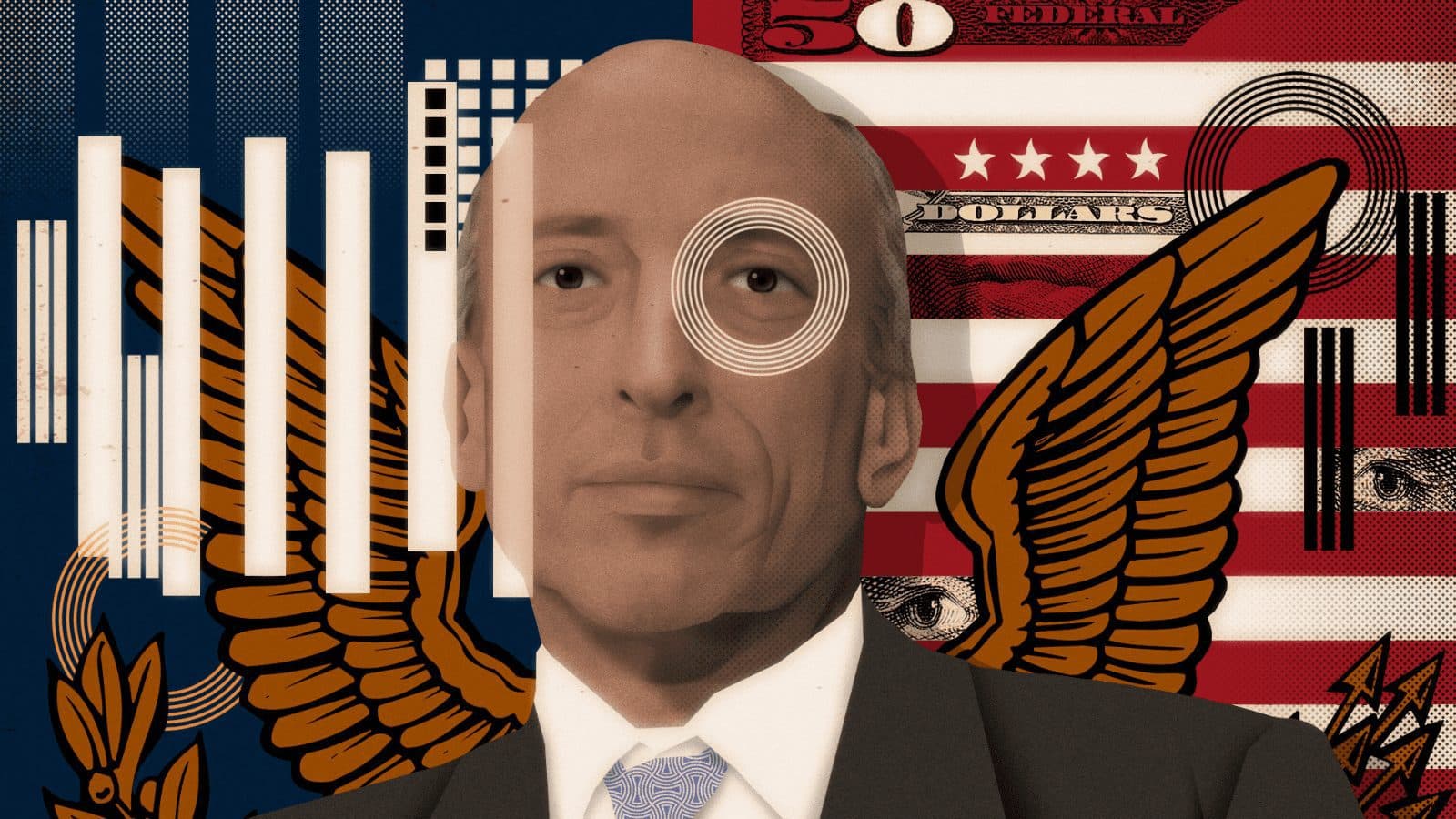As Crypto Regulatory Scrutiny Builds, Gensler Urges Firms To Register With SEC
Digital asset platforms are likely trading securities and should start working with regulators, SEC Chair Gary Gensler said

SEC Chair Gary Gensler | Blockworks exclusive art by axel rangel
key takeaways
- The probability is quite remote that any crypto platform has zero securities, according to Gensler
- Basic “rules of the road” will ultimately build confidence and trust in crypto markets, he said
It’s imperative for crypto platforms to register with the SEC to build trust and become compliant, SEC Chair Gary Gensler said Monday.
Speaking at the Penn Law Capital Markets Association Annual Conference, which focused on the future of crypto, Gensler reiterated that crypto firms are likely trading securities — which fall under the regulatory purview of the SEC.
A majority of the 5,000 or so crypto tokens are still in the early innings, he said, and the public is generally investing anticipating profits based on the efforts of others — meeting the definition of an investment contract by the Supreme Court’s 1946 Howey Test.
“We do our best within our authorities to protect the public, but until and unless the platforms are actually registered and regulated, I don’t think the tokens will significantly come in and register,” Gensler said. “The platforms really ought to register; it’s in their long-term business interest. They just haven’t quite agreed with me on that.”
Centralized and decentralized crypto trading and lending platforms trade digital assets worth more than $100 billion per day, Gensler said. A typical trading platform has at least dozens of tokens on it, with some supporting hundreds.
“While each token’s legal status depends on its own facts and circumstances, given the commission’s experience with various tokens that are securities, and with so many tokens trading, the probability is quite remote that any given platform has zero securities,” he said.
Gensler pointed to the SEC’s charging BlockFi in February of failing to register its retail crypto lending product with the agency, among other violations. The company, which was expected to pay $100 million in fines, agreed to attempt to bring its business into compliance with finance laws, he said.
In addition to crypto tokens and platforms, the SEC head shared concerns around stablecoins, noting “there are conflicts of interest and market integrity questions that would benefit from more oversight.”
“The three largest stablecoins were created by trading or lending platforms themselves, and US retail investors have no direct right of redemption for the two largest stablecoins by market capitalization,” he said.
Gensler said last September that stablecoins are “acting almost like poker chips at the casino,” adding that many are not backed in-kind, dollar-to-dollar.
Bills designed to regulate digital assets are soon expected to be introduced by US lawmakers.
President Joe Biden signed an executive order last month that called on various government agencies to study the “responsible development” of digital assets.
Gensler also addressed crypto advertisements that aired during the Super Bowl, noting that ads “don’t equal credibility.” Many of the “dotcom” companies that marketed during the 2000 Super Bowl are now defunct, he said.
Basic “rules of the road” will ultimately build confidence and trust in crypto markets, according to the chairman.
“Traffic lights, speed limits, cops on the beat came with some cost,” Gensler said. “If we hadn’t done those reforms in the 1910s and ’20s, not just in the US, but around the globe, would we have sold as many cars? No way — we couldn’t have. Too many people would have been dying on the roads.”
Get the news in your inbox. Explore Blockworks newsletters:
- The Breakdown: Decoding crypto and the markets. Daily.
- Empire: Crypto news and analysis to start your day.
- Forward Guidance: The intersection of crypto, macro and policy.
- 0xResearch: Alpha directly in your inbox.
- Lightspeed: All things Solana.
- The Drop: Apps, games, memes and more.
- Supply Shock: Bitcoin, bitcoin, bitcoin.





